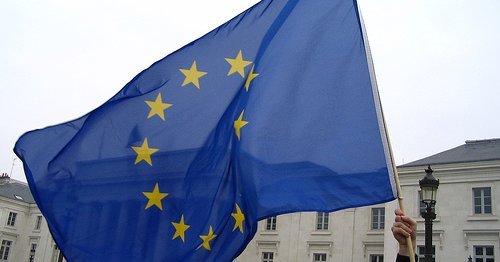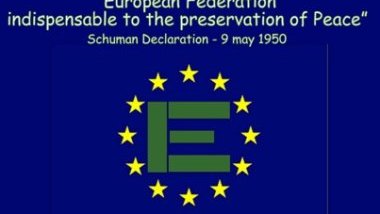Return to Part 1.
After having clarified the point of the federalist approach on the Schuman Declaration, let us go back to the relationship between the functionalist approach and Schuman’s initiative. The previously mentioned impasse, which the French government had come to, opened for Monnet a window of opportunity that enabled him to realise the revolutionary invention of the European Community system. The ECSC actually had in common with the early European intergovernmental organisation the characteristic that decisional power was ultimately still in the hands of the national governments, which corresponded to the fact that not all the governments were willing to accept the irreversible handing over of their sovereignty to supranational bodies (the treaty’s validity was limited to only fifty years!). Nevertheless, it already displayed some important federalist traits: the crucial role given to a body, the High Authority, that was independent from national governments; the direct effectiveness of Community legislative and judicial acts within the member States; the allocation of own resources to the community budget based on a levy and on European bonds; the principle of vote by majority for a part of the resolutions of the Council of Ministers; the possibility to directly elect the common parliamentary Assembly, which also had the power to dismiss the High Authority with a no-confidence vote. It should be underlined that the governments had to accept these federal characteristics because the achievement of an objective much more advanced than the mere liberalisation of trade actually required stronger and more efficient institutions, which should be, at least in perspective, democratised, in order to avoid a situation in which the competences transferred to a supranational level might not be subject to effective democratic control. The final goal of a federation was not mentioned in the text of the treaty but it was stated in the text of the declaration on the basis of which the negotiations were carried out; since the declaration was accepted by the other governments, it turned into an official commitment towards the final purpose of European integration.
The choice to operate outside the juridical framework of the OECD and the ECSC led to the creation of an advanced core group of States within a wider circle supporting purely intergovernmental cooperation, in the belief that the success of the venture would later result in the involvement of States that had previously been reluctant – which is what actually happened.
Besides these elements included in the Schuman Declaration and in the treaty deriving from it, the federal perspective can also be detected in the choice of proceeding on the basis of a more limited group of countries in comparison to the States involved in earlier pro-European initiatives. When the ECSC proposal was put forward, the OEEC had existed for over two years and the Council of Europe for one year; they included the Six as well as the United Kingdom and the majority of Western European countries. The crucial procedural choice made by Schuman was precisely to operate outside the juridical framework of these two organisations, within which the United Kingdom and, in its train, the Scandinavian countries and Portugal would have eliminated the innovative features of the initiative, and to open negotiations only among the governments that were willing to discuss the implementation of a supranational authority. This led to the creation of an advanced core group of States within a wider circle supporting purely intergovernmental cooperation, in the belief that the success of the venture would later result in the involvement of States that had previously been reluctant – which is what actually happened.
This procedural choice asserted itself due to the nature of the problem to be solved (avoiding the full re-establishment of German sovereignty) and thanks to the initiative of the EFM and the Union of European Federalists, of which the EFM was a member and the leading vanguard. Immediately after the Council of Europe came into being, the federalists organised a wide campaign throughout Europe to promote the stipulation of a federal pact for the establishment of a supranational political authority, democratically elected and provided with the necessary powers to implement a progressive economic unification, run a common foreign policy, and organise common defence measures. The coming into effect of the federal pact among the ratifying countries – and this was the key point – would not require unanimous vote by the member countries of the Council of Europe, but its ratification by at least three States reaching a total population of one hundred millions would be sufficient. The federalists basically proposed to apply to the European unification one of the fundamental principles characterising the procedure on the basis of which, in North America, the Philadelphia Convention of 1787 drafted the first federal constitution in history, i.e. the overcoming of the unanimous ratification requirement. This move by the federalists undoubtedly made Schuman and the governments of the Six even more determined to proceed with the strategy of the vanguard group.
3. The topicality of the Schuman Declaration
Sixty years after the Schuman Declaration, it is clear that great progress has been made towards European integration. Within a framework of gradual advancement in a federal and democratic direction of the European Community system (in particular, direct election and widening of the powers of the European Parliament, and extension of the majority vote), very relevant integration goals have been achieved. These range from the single market to the historic transition to a monetary union, which would not have been possible without the option in favour of the method of the vanguard group, from extending to most European countries to the Treaty of Lisbon, whose steps forward – though not decisive – are linked to the involvement, through the Convention, of European and national members of parliament. These developments testify, with irrefutable factual evidence, the soundness of the choice made in 1950 to overcome mere intergovernmental cooperation and to include the federal perspective in the European unification policy, in relation to both the institutions and the procedures to establish them.
I wish to emphasise that pro-European movements supporting federalism have greatly contributed to these steps forward. Through their continuous, systematic, and pervasive actions, they have kept alive the idea of a European federation and of the participation by the people in its creation.
In order to have an appropriate, comprehensive view of the process, I wish to draw on what mentioned before and emphasise that pro-European movements supporting federalism have greatly contributed to these steps forward. Through their continuous, systematic, and pervasive actions, they have kept alive the idea of a European federation and of the participation by the people in its creation, based on the democratic constitution method – an idea that would have been erased from the political agenda without their contribution. Moreover, they have played a fundamental role at a number of crucial moments in the creation of today’s Europe. In particular, I wish to mention: the transformation of the project for a European Defence Community into a plan for a military, political, and economic union on a federal basis (the European Political Community), which failed in 1954 but laid the foundations for the later creation of a European Economic Community; the campaign for the direct election of the European Parliament and for the strengthening of its powers; Spinelli’s action in favour of the European Union Treaty, approved by the European Parliament in 1984, which strongly contributed to the drafting of the European Single Act and, more generally, to the process for the reform of European treaties, whose most recent achievement is the Treaty of Lisbon; a steady commitment to the implementation of a single European currency, which has been constant since the 1960s (in this regard, I would like to mention that in 1965 the federalists had some symbolic coins named Euro minted in Bologna!).
This said, it is a fact that the final goal of the European federation has not been achieved yet and we should now ask ourselves if Schuman’s declaration is still relevant in relation to it. This question must be asked because the validity of the distinction between federation and confederation is being challenged by many, thus denying that the European integration process could or should be aimed towards the creation of a federal State. This stance is often linked to the belief that, within the context of globalisation, the State form is not only objectively in crisis but doomed to be replaced by something else, which however those who challenge the integration progress are not able to define clearly.
This stance is often linked to the belief that, within the context of globalisation, the State form is not only objectively in crisis but doomed to be replaced by something else, which however those who challenge the integration progress are not able to define clearly.
Conversely, I believe that the federalist discourse is nowadays still fully relevant. This conviction is based on the following remarks:
– The federal State model, reasonably conceivable as the solution to the European unification issue, shall have characteristics that are original and different from those of the federal systems implemented so far. This is because, for the first time in history, it shall bring together into a federation a set of national States that are historically consolidated and a continent characterised by cultural, linguistic, religious, economic, and social pluralism with no equals in the world (which is a major asset that should be protected and supported). Therefore, it shall be a strongly decentralised type of federalism (hence, I believe, more authentic) but in which any form of national veto shall be excluded, despite granting space to qualified majorities. The federal monopoly of legitimate force shall be implemented and the principle of democratic responsibility of supranational political bodies shall be fully applied. These are the necessary requirements to fully overcome the shortcomings of European integration from the point of view of efficiency and democracy, thus making it irreversible.
– The only valid response to the draining of national sovereignties ensuing from the growing international interdependence, of which globalisation is the most recent development, does not lie in resignedly accepting the decline of the State but rather in extending the scope of the democratic State and in strengthening the democratic participation tools, which are made possible thanks to the subsidiarity principle typical of a fully developed federal system. Since the State form is the irreplaceable starting point for the pursuit of the common interest, i.e. for pacific cohabitation, for the protection of liberal-democratic rights, for social solidarity and solidarity to future generations (sustainable development), the great design that should be pursued by all those who, in a steadily more interdependent world, wish to commit themselves to progress and to the very survival of humankind is the gradual and coherently sought creation of a worldwide democratic and federal State.
The most urgent issue is completing the construction of the European federal State, because only a Europe that is fully capable of action can play an active and crucial role in a world hanging in the balance between setting up institutions and policies indispensable in order to face a common destiny and catastrophic anarchy.
In this perspective, the most urgent issue is completing the construction of the European federal State, because only a Europe that is fully capable of action can play an active and crucial role in a world hanging in the balance between setting up institutions and policies indispensable in order to face a common destiny and catastrophic anarchy. As stated in the Schuman Declaration, the mission of a united and pacified Europe is to provide a fundamental contribution to world peace, which consequentially means endorsing, through example and action, the creation of other continental federations and, at the same time, contributing to the federal unification of the entire world, as declared in the Ventotene Manifesto. The only alternative to this form of development is the triumph of a neo-feudal dispersion of sovereignty and, as a result, of generalised anarchy, which those theorising the new Middle Ages seem willing to accept with irresponsible thoughtlessness.
– Thanks to the progress made, the European integration process has reached a point in which postponing its evolution towards federalism is no longer compatible not only with the advancement but with the very preservation of European integration. On one hand, the monetary unification (the most important objective achieved so far) has led to a point in which it is no longer possible to back up the contradiction that has always characterised the functionalist integration model, linked to indefinitely postponing the implementation of supranational democratic sovereignty. If draining the ability to steer the economic process by means of national economic and social policies is not complemented by the creation of a European democratic government capable of ensuring economic-social cohesion and the competitiveness of the European economy within the framework of globalisation and, more generally, of overcoming the abnormal discrepancy between the dimension, still fundamentally national, of political-democratic responsibility and the dimension of actual decisions, then the democratic system is doomed to plunge into a fatal crisis. An alarming warning sign of this is the fact that populist, Europhobic, micro-nationalistic, and xenophobic tendencies are gaining more and more ground. On the other hand, a rapid transition to a fully federal union is imposed by the international context, characterised by the irreversible decline of the American hegemony and by the creation of a pluri-polar world system – and it is of vital importance to make this federal union structurally cooperative. This means that the European Union must become a producer of global security instead of remaining a mere consumer of security in the shadow of the American umbrella. The creation of supranational democratic and efficient institutions is finally indispensable to face the problems linked to the extension (already implemented and still to be completed) of the Union to central, eastern and Balkan Europe and also to Turkey – which represents a great and imperative challenge for Europe but is doomed to result in devastating consequences if not complemented by the complete overcoming of the limits of functionalist integration.
These are the reasons why it is fully and urgently topical to achieve the ultimate goal – a European Federation – stated in the Schuman Declaration, but it is equally topical to keep in mind the strategy of the vanguard group. Nowadays, this implies two things. On one hand, it is necessary to implement any possible steps forward within the framework of the Treaty of Lisbon (in particular, those concerning the European economic government and the international role of the European Union), by going ahead together with those who agree to said steps and, consequently, by taking advantage of strengthened cooperation and structured cooperation in the field of defence. On the other hand and simultaneously, it is necessary to initiate, based on initiatives by those countries that are willing, a transition process towards the European federation. This implies: transferring to the European level sovereignty in the fields of foreign policy, security, and economy (in their general aspects), with the allocation of financial resources and sufficient armed forces to allow for the ability to act and govern independently; the drafting of a federal Constitution, providing for a government system structured across several coordinated and independent levels, with a federal executive branch responsible to the parliament and a bicameral legislative branch made up of a chamber of the States and a chamber of the people’s representatives; the drafting of the Constitution by a democratic constituent convention and its ratification by the citizens, within a framework that is respectful both of the acquis communautaire and of the wish to join the project at a later stage by those countries that shall decide to do so.



Follow the comments: |
|
